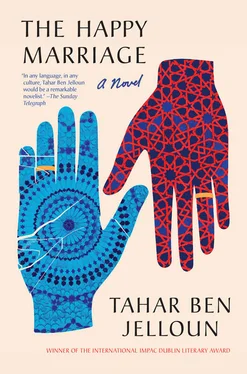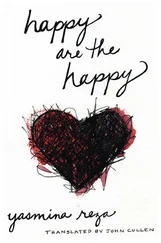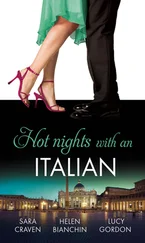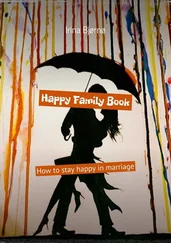Let’s go back to the very beginning. Our wedding. What a disaster. Oh, I’ll remember that Friday in April for the rest of my life. All brides look back on their wedding day with joy, but not me. That day will forever remain a black day, a sad day, a day when I cried a lot. Newlyweds usually cry because they are leaving one family to become a part of another, but I was crying because I was leaving my family to plunge into an unimaginable hell.
Allow me to set the scene for you.
My parents had leased a holiday home on the outskirts of Casablanca. It must have cost them a great deal of money. They had wanted to make a good impression on their future in-laws, whose urban origins intimidated them. People from Fez think of themselves as superior to all other Moroccans. They look down on the rest of Morocco as though their culture was the only one worth anything, behaving as though everyone else has to cook like them, dress like them, and speak like them. They have a natural propensity for intolerance and don’t make any efforts to conceal their contempt. It’s not that they’re nasty, just cynical. My parents were set against my marriage for several reasons. My mother told me that my father, who rarely spoke, had told her: “We don’t belong with them and they don’t belong with us!” He’d also said: “I’m not sure our daughter will be happy in that family; that her husband is older than she is might not be such a big deal, but his family scares me. I never know how to welcome them or how to act, they belong to a different world and we’re simply unpretentious folk. It makes me wonder whether we even believe in the same God! Well, there we have it. Tell her to do what she wants. Tell her I’m sad.”
I remember that conversation with my mother and how I couldn’t really disagree with her because I knew she had a point. But it was too late by then, I was in love. What did being in love mean to a girl who’d had to tackle so much misery so early on in her life? I thought of him as though I was living in a kind of modern fairy tale. I ignored all the defects I noticed. I thought he would live up to my expectations. But romantic love is in fact a fiction invented by novelists. I’d read several novels set in nineteenth-century Scotland. I would dream of those rainy landscapes, delicate characters, and those declarations of love that were imbued with poetry and promises. I thought of myself as one of the heroines of those novels and believed in all of it. The transition from fairy tale to reality proved difficult, very difficult indeed.
I remember how one day, before we’d gotten engaged, Foulane had waited for me in his apartment on Rue Lhomond. I had taken the train and on my arrival at the Saint-Lazare station I felt an incredible weight on my chest. For the first time in my life, I was frightened. I went into a café, ordered a cup of tea, and spent hours smoking and thinking, watching the film of my future life flash past my eyes. I had a certain knack for predicting how my future would turn out. Even though I was in love, I wasn’t under any illusions. I knew that his family wouldn’t miss an opportunity to remind me of my humble origins and how inadequate an addition I was to their family portrait. I knew that he wouldn’t stick up for me and that he shared their ideas. I could clearly see that I was about to make a mistake, but I stupidly told myself that I was fated to marry him. I had read many French novels and identified with petty bourgeois characters from the provinces, and like them, I convinced myself that I had an intense inner life.
Foulane was waiting for me, but I didn’t call him to say I would be running late. I didn’t want to make that meeting, knowing that I would be lost if I crossed that threshold. When I’d smoked my pack of cigarettes, I got up, looked up the train schedules, and saw I couldn’t get on one until 10:10, but that it was only 8:00 by then. So I started to walk, jumped on the 21 bus, got off at Boulevard Saint-Michel, and headed toward his apartment.
It was cold and I was only wearing a light jacket, so I was shivering. He took me in his arms, kissed me, warmed me up, cooked some delicious fish, and then we made love. It was the first time I’d given myself to him. I got up in the middle of the night and wanted to smoke, so he took the car to get me some cigarettes. He also bought some croissants for the following morning. I had a class that day and showed up late, so the professor of philosophy held me back after class. He made it clear that he wanted to take me out to dinner any time during the week except on Saturday or Sunday, which was when he saw his kids since he was divorced. Partly out of defiance and partly out of curiosity, I decided to take him up on his offer and agreed to see him on Friday. His intentions were clear: he wanted me to be his mistress. He was a handsome, intelligent man and was rather seductive. I refused his advances several times, then stood to leave, using the excuse that I had to catch a train. He grabbed my hand, kissed it, and said: “Don’t worry, I’ll drive you home.” I tried to explain that it was over thirty miles outside of Paris, but he insisted, hoping he would thus have the time to convince me not to get married. Everyone knew that I was going to marry a famous painter. It had even been mentioned in a newspaper.
A month later, Foulane came to visit my parents in Clermont-Ferrand, accompanied by six of his closest friends, so that he could formally ask for my hand in marriage. It was a Saturday and my father was home from work. It went fairly well, certainly better than on the wedding day itself. His friends found out that I belonged to a family of immigrants and saw that we came from a humble background. This had never been a problem between Foulane and me. He knew where I came from, but I didn’t know about his origins, or what his life had been like before we’d met.
The following week Foulane introduced me to his parents at a restaurant in Paris. He’d bought their airline tickets and called a friend of his who loved his paintings and worked at the French consulate in Casablanca to fast-track their visas. I heard his mother say behind my back: “This can’t be the girl he was talking about, she’s not … She’s not even white.” I pretended that I hadn’t heard her. My skin was fairly dark because I tanned very easily. I smiled. His father was far more sympathetic. He immediately asked me a number of questions about my village, my father’s property, and our traditions. He even asked me: “Is it really true what people say, that you people have magical powers?” I laughed and said, “I have no idea.” But deep down he too disapproved of the match. You can’t hide such things, I could see it in his face and in his eyes. I didn’t know if he was talking about me, but I heard him say “media mujer” several times — which is Spanish for “tiny woman,” an expression he often used to refer to his wife’s small frame. I also heard him use the word khanfoucha , meaning “beetle” in Arabic; was he talking about me? I’d landed in the middle of a family of lunatics! They spoke in innuendos and metaphors. I wasn’t used to those kinds of jokes. My parents never insulted anyone and never spoke ill of people. Some of the women who worked for my mother-in-law took me aside to warn me that my life would be difficult, that it was a matter of class complicity. One of them said: “You know, little one, Fassis don’t like us much. There’s nothing that can be done about it, they think they’re better than us and they don’t really respect other people! So watch out, your husband is a nice man but his sisters are absolutely terrible!”
I could have changed my mind, called everything off, and gone back to my parents’ house. There was nothing stopping me. I can’t quite understand what made me embark on that dangerous adventure. Love, of course. But I still ask myself whether I ever really loved him. I liked him and found him alluring and charming; besides, he was an artist, and I’d always wanted to rub shoulders with that wonderful magical world of musicians, writers, and painters. It was like a dream. So despite those worrisome signs, I pressed ahead and plunged headfirst into married life.
Читать дальше












